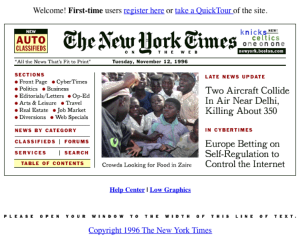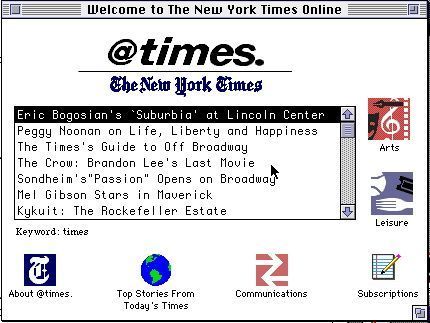Mon, 3 November 2014
Summary:Halsey Minor is an absolutely legend when it comes to the online era. Along with names like Jerry Yang, Jeff Bezos, Pierre Omidyar and others, Halsey Minor deserves credit for creating one of the first truly great companies on the web: CNet. Halsey recounts the CNet creation story with us, but also goes into his early days on Wall Street, with another entrepreneurially-focused young man named Jeff Bezos. And toward the end of our talk, Halsey talks about the project he’s embarked upon now, which is working in the bitcoin space. Interestingly, Halsey feels that Bitcoin as a technology has the potential to be every bit as revolutionary as the web was, and perhaps even more so. So please enjoy a conversation with Halsey Minor.
Direct download: Ch._5_Int._9_-_CNET_Founder_Halsey_Minor.mp3
Category:Chapter 5 -- posted at: 12:29pm EDT |
Mon, 27 October 2014
The first banner ads went live on the web 20 years ago today, October 27th, 1994, when the website HotWired.com first launched on the internet. We've spoken to some of the people responsible for the creation of these ads, and so, in honor of the anniversary, I have re-edited their interviews into an oral history that tells the whole story. But in case you think you've heard all this before, please note that there are segments from 4 entirely new interviews that you have NOT heard before. So, if you want to hear the whole story comprehensively, download and listen! Please note: The post on the website for this episode has all the ads and graphics we mention throughout the podcast, so please check that out to see the full picture.
Direct download: An_Oral_History_Of_The_Webs_First_Banner_Ads.mp3
Category:Chapter 5 -- posted at: 1:25am EDT |
Mon, 20 October 2014
Summary:Younger listeners might know John Battelle as being one of the original forces behind the Web 2.0 movement, as the founder of the Web 2.0 Summit as well as Federated Media. But John was also the founding editor of both Wired Magazine and Industry Standard magazine, that great, lost magazine of record for the dot com era. For our purposes, we’ve been focusing more on HotWired, so that’s why I was super excited to speak with John and get some of the background stories from Wired the magazine as well as Industry Standard. Enjoy!
Direct download: Ch._5_Int._8_-_Wired_Magazine_Founding_Editor_John_Battelle_johnbattelle.mp3
Category:Chapter 5 -- posted at: 11:45am EDT |
Mon, 6 October 2014
Summary:Joe McCambley is one of the more prominent names in modern digital marketing and advertising. He's had major roles at Digitas, at AOL in it's modern incarnation and he's the co-founder of the Wonder Factory. I wanted to talk to Joe about his time with Modem Media, where he was one of the creative forces behind the development of the first banner ads that premiered alongside the launch of HotWired. The 20th anniversary of these first banner ads is coming up at the end of the month, and I'm putting together a special episode where I'll edit together interviews from several different people all for one comprehensive piece that will tell the story. As I told Joe after this interview, my original intention was just to use this conversation as a part of that piece. But our discussion went in such wonderful directions, delving deep into nature of modern advertising and the future of marketing in the digital age, that I decided this deserved to be it's own stand alone-episode. If you're working in digital media today, I think this is required listening. Sponsor link: audibletrial.com/internethistory The "You Will" campaign can be viewed here. The first banner ad can be viewed here.
Direct download: Ch._5_Int._7_-_An_Interview_With_Joe_McCambley_About_The_First_Banner_Ads.mp3
Category:Chapter 5 -- posted at: 10:43am EDT |
Mon, 29 September 2014
Summary:Owen Thomas is one of the most prominent voices in modern web media. He is currently the editor in chief of ReadWrite.com, but he was also the west coast editor for Business Insider, the founding editor of Daily Dot, executive editor of VentureBeat, managing editor of Valleywag… and I could go on and on… Business 2.0, Red Herring, etc. I was particularly excited to talk to Owen about some of his earliest jobs, at HotWired and at Suck. Owen gives us some more great background about the launch of Hotwired and the inner workings of Suck. Sponsor link: audibletrial.com/internethistory
Direct download: Ch._5_Int._6_-_Owen_Thomas_of_HotWired_and_Suck.mp3
Category:Chapter 5 -- posted at: 10:18am EDT |
Mon, 22 September 2014
Summary:Soon after the founding of Wired Magazine, it was decided that Wired needed a major web presence. Andrew Anker was recruited to write a business plan and launch a website that would become HotWired.com. As we’ve seen in this chapter, HotWired was among the first stand-alone media websites, and pioneered a great many things, not the least of which were the first banner ads. Andrew gives us some wonderful insights into the early days of Wired (going back to the magazine’s funding) as well as the evolution of HotWired, Suck, Hotbot and other early web properties he helped bring to life.
Direct download: Ch._5_Int._5_-_HotWired_CEO_Andrew_Anker.mp3
Category:Chapter 5 -- posted at: 2:02pm EDT |
Mon, 15 September 2014
Summary:We continue our survey of early web media plays with some that have lasted the test of time and some that, while not currently extant, were lasting in terms of impact. It’s a big episode. WSJ.com. NYTimes.com. EOnline. The Weather Channel. ZDNet. CNet. Salon. Slate. Wired magazine and HotWired.com. And our long lost, beloved Suck.com. By the way, as promised, here are some early NYTimes screenshots, compliments of Rich Meislin. 
And here’s an early NYTimes.com homepage Bibliography:
Direct download: Ch._5_Part_2_-_Wired_CNET_Salon_Slate_and_Suck.mp3
Category:Chapter 5 -- posted at: 2:09pm EDT |
Mon, 8 September 2014
Summary:Rob Glaser was, and is, the founder and CEO of Real Networks. If you were around in the 90s, you’ll remember Real Audio and Real Video and the Real Media player. In the age before broadband, Real Networks pioneered streaming media on the web. Quite simply, the early web would not have been multimedia without Real, and by the late 90s, fully 85% of the streaming audio and video on the web was Real Media. But Rob was also an early Microsoft Executive, so the interview starts out with Rob giving us some fascinating stories about being recruited to join Microsoft in the early 1980s as well as his work with the successful relaunch of Microsoft Word and Excel in the mid 80s.
Direct download: Ch._5_Int._4_-_Real_Networks_CEO_Rob_Glaser.mp3
Category:Chapter 5 -- posted at: 12:07pm EDT |
Mon, 18 August 2014
Summary:Oliver Knowlton is another one of our Pathfinder.com alumni. He’s had a wide and varied career in media, from his role as the General Manager of Sports Illustrated to his current role as the VP of the Digital Portfolio Group at Gannett, he’s been working in various aspects of digital media for two decades. Our previous Pathfinder interviewees have given us bookends of the pathfinder story, its origin story and the denouement, as it were. Oliver’s discussion gives us a great summation of the story from someone who was there for the whole ride.
Direct download: Ch_5._Int._3_-_Pathfinder_Executive_Oliver_Knowlton.mp3
Category:Chapter 5 -- posted at: 3:25pm EDT |
Mon, 4 August 2014

Summary:Linda McCutcheon is another Pathfinder veteran. She came up through Time Inc. on the marketing side, so she was the one responsible for landing the first advertisements that ran on the Pathfinder site. But she also stayed at Time Warner through the entire lifecycle of Pathfinder, eventually rising to head the entire Time New Media operation. Linda gives us a great recap of entire era from the Full Service Network efforts through to the dot com days when she successfully brought Time New Media into profitability. One small note… halfway through we lost our Skype connection, ironically because her Time Warner Cable signal went down in her office. So, there is a bit of an interruption halfway through. But allowing for that, it’s a brilliant conversation about the past, present a future of media.
Direct download: Ch._5_Int._2_-_Pathfinder_Executive_Linda_Mccutcheon.mp3
Category:Chapter 5 -- posted at: 11:56am EDT |
Mon, 28 July 2014

Summary:Craig Bromberg has had a long and fascinating career at the intersection of media and technology. An early adopter of online technologies, Craig was a freelance writer when he was chosen by Pathfinder head Walter Isaacson to become the first editorial director of the Pathfinder project. Craig tells us about the thinking that went into the launch of the website and the strategic goals Pathfinder was intended to achieve. But he was also a participant in the byzantine corporate politics that so hobbled Pathfinder’s trajectory, and he gives us a fascinating first hand account of what it was like to fight for a specific vision inside a big organization like Time Warner. Craig has worked with media from every angle and so the second half of the interview sees us get into a fascinating discussion about where media is doing and how it can succeed in a digital age.
Direct download: Ch._5_Int._1_-_Pathfinder_Executive_Craig_Bromberg.mp3
Category:Chapter 5 -- posted at: 1:12pm EDT |
Sun, 20 July 2014

Summary:We’ve been looking at how companies were feeling their way into the internet era, trying to create new industries and new mediums without precedent or a road map. But thus far, we’ve mainly been looking at pure-play tech companies. And when the web revolution came, everyone wanted a piece of it, not just the tech world. So, this episode looks at the creative and business efforts of those people companies who came from outside the traditional environs of Silicon Valley. We’re largely going to look at big media. When the web began, it was considered to be a new medium, and so it was assumed by many if not most people that big media would logically dominate this new medium. The reason this did not come to pass is complicated, and we’ll look at some of the many reasons why. We’ll look at pioneering newspaper efforts like the San Jose Mercury News’ Mercury Center. We’ll examine unlikely big media web properties that got the web exactly right, like the Weather Channel. We’ll look at how one unlikely company, Reuters, singlehandedly disrupted the entire content industry by turning news into an online commodity. And more than anything, we’ll look at the rise and ignominious fall, of Pathfinder, onetime rival of sites like Yahoo, the portal that maybe wasn’t a portal, the greatest website you don’t remember. I mention the Pathfinder Museum. Go there for great visual and data artifacts from the site. There is an exceptional (and exceptionally long) profile of the Mercury Center saga from the Columbia Journalism Review. Bibliography:
Direct download: Ch._5_Part_1_-_Mercury_Center_and_Pathfinder_-_Big_Medias_Big_Web_Adventure.mp3
Category:Chapter 5 -- posted at: 3:30pm EDT |
Internet History Podcast (Chapter 5)

Categories
Chapter 1Chapter 2
general
Chapter 3
Chapter 4
Chapter 5
Analysis
Chapter 10
Chapter 6
Misc. Episodes
Chapter 7
Archives
JulyJune
May
April
March
February
January
December
November
October
September
August
July
June
May
April
March
February
January
December
November
October
September
August
July
June
May
April
March
February
January
December
November
October
September
August
July
June
May
April
March
February
January
December
November
October
September
August
July
June
May
April
March
February
January
December
November
October
September
August
July
June
May
April
March
February
| S | M | T | W | T | F | S |
|---|---|---|---|---|---|---|
| 1 | 2 | 3 | 4 | 5 | 6 | |
| 7 | 8 | 9 | 10 | 11 | 12 | 13 |
| 14 | 15 | 16 | 17 | 18 | 19 | 20 |
| 21 | 22 | 23 | 24 | 25 | 26 | 27 |
| 28 | 29 | 30 | ||||
Syndication


